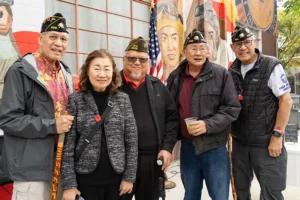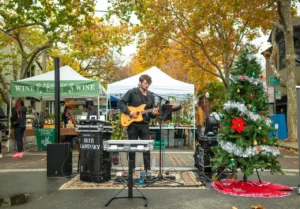
Sacramento mayoral candidate Kevin McCarty. (Photo by Fred Greaves)
CapRadio interviewed the four major candidates for Sacramento mayor in the March 5 primary election. We asked how their life experience has shaped their approach to dealing with two of Sacramento’s most pressing problems: The city’s homelessness crisis and severe lack of affordable housing.
George Sim Park in Lemon Hill is a special place for state Assembly member Kevin McCarty. The 52-year-old got his start in politics in 2004 representing the South Sacramento neighborhood on the City Council.
“And as a young council member, one of the first things I did was to help bring back baseball to this neighborhood, which had a thriving Little League for decades that went away for about 20 years,” McCarty explained last month, speaking near the park’s baseball diamond.
After joining the council, McCarty partnered with the San Francisco Giants and their Junior Giants league to restart youth baseball at the park.
Hundreds of children play each summer on what’s now called Matt Cain Junior Giants Field, after the team’s World Series winning pitcher. The league offers kids something McCarty had growing up: A safe haven.
“After school programs and sports programs kept my brother and I safe and out of trouble and kept us focused,” said McCarty, who was raised by a single mom. “I believe activities for our youth are so critically important to help young people succeed.”
McCarty, who’s spent the last decade in the state Assembly, said he remains an advocate for Sacramento’s youth and will keep focused on their needs as he seeks his return to local politics as the city’s next mayor.
If elected, McCarty will face two challenges that rise above nearly all others and afflict Sacramentans young and old: the city’s lack of affordable housing and its sprawling homelessness crisis. The lifelong Sacramentan said he’s ready for the fight.
“This is my city. This city gave so much to me,” McCarty said, as he walked through George Sim Park on a sunny afternoon last month. “It gave me and my family a chance when we were growing up here, struggling. And I want to give back to Sacramento.”
McCarty says he never lost focus on his hometown

McCarty won election to the council three times after serving on the city’s housing and redevelopment commission. He was a vocal critic of Sacramento’s $255 million subsidy for the Kings downtown arena, delivering one of the council’s two “no” votes on the plan in May 2014, saying voters should have decided on the deal.
That same year, McCarty moved on to represent Sacramento in the state Assembly, where he’s served since 2015. During that time, the Democratic lawmaker has advocated for causes such as police reform, universal preschool and restoring voting rights for the formerly incarcerated.
He’s been endorsed by a wide range of labor groups, state and local public officials — including Sacramento City Council members Caity Maple and Karina Talamantes — and community leaders.
While at the Capitol, McCarty said he’s never lost focus on his hometown. He’s secured state funds for Sacramento’s parks, after school programs, business districts and homeless services.
The father of twin teenage daughters said he remains an advocate for giving kids a strong start. If elected mayor, McCarty said he’ll tackle Sacramento’s affordable housing crisis so that young people can pay for a new home or apartment in the city.
“Sacramento needs to do a much better job at building more housing at all income levels so young kids can thrive here,” McCarty said. “My kids are in high school. They’re going to go away to college hopefully in the next few years. I want them to be able to come back with their friends and be able to afford a house in Sacramento.”
McCarty said that starts with cutting through Sacramento’s red tape. He said he’ll ask developers for advice on how to streamline what the industry describes as a cumbersome building permit process.
That process is crucial, he said, for the builders of everything from large affordable housing projects to backyard granny flats — both of which can boost Sacramento’s housing supply.
“They all talk about how the city isn’t as nimble as it could be to get projects started and eventually completed,” McCarty noted.
McCarty said he also backs inclusionary housing policies that help integrate Sacramento’s neighborhoods both ethnically and economically. But he doesn’t support requiring developers to include a certain percentage of affordable units in their projects, a policy the council could vote on this spring.
“I don’t think that’s economically viable,” McCarty said of the potential mandate. “I think that would halt construction of all housing in Sacramento.”
Sacramento had an inclusionary housing requirement from 2001 to 2015, but replaced it with a program that charges developers an “in-lieu fee,” revenue from which is used to build affordable housing.
McCarty said he supports increasing the fee to keep up with inflation and boost the city’s affordable housing supply.
“I grew up in multi-family housing communities where they had mixed incomes,” McCarty said. “I think that’s what you want in a society. That’s how people thrive is having people who are very, very different amongst them.”
‘Show people where they can go’
Like many Sacramentans, McCarty is drawn to the natural beauty of the American River Parkway. If he’s not coaching youth baseball or voting on bills in the Legislature, McCarty said he often walks along the corridor or paddle boards on the river.
“We’re so lucky to have this amenity in the heart of Sacramento,” he said.
McCarty said preserving the parkway would be one of his top priorities as mayor, as would finding a home for the hundreds of unhoused residents who camp there.
“Whether it’s the baseball field at George Sim or the parkway, you can’t camp on our parks,” McCarty said, motioning to an encampment near the field’s third base dugout.
But he also said Sacramento must be more aggressive in opening emergency homeless shelters at places like Cal Expo, on city property and on vacant land under freeways.
“We need to show people where they can go,” he said.
With some city- and county-run homeless camps costing millions of dollars to operate, McCarty said he’s open to less expensive options like camps run by churches, nonprofits or by those who live there.
“There’s other options I support like Camp Resolution where it’s self-governed,” McCarty said, referring to a large North Sacramento encampment whose founding members reached an agreement with the city last April to run the camp. “I don’t think we should be spending as much as we are on these Cadillac versions.”
He adds that homeless shelters should be established throughout Sacramento and not concentrated in a select few lower-income neighborhoods including North and South Sacramento.
“It’s an equity issue,” McCarty said. “I think it’s a fundamental question of fairness. We are all in this together. And we all need to be part of the solution.”
Asked what sets him apart from the other candidates, McCarty is quick to point out he’s the only lifelong Sacramentan. He moved to Sacramento with his mother when he was a toddler. The others moved to the city in their 20s.
McCarty said his racial and family background – his late mother was white and his father is Black – also sets him apart. “I’m a lifer here. I come from a diverse background representing the rich diversity of Sacramento coming from a biracial background raising tri-racial kids,” he said, noting his wife is Latina.
As the only candidate to serve in both state and local office, McCarty said he’s proven he can lead Sacramento.
“I know how to solve problems and I know how to bring resources from the state to Sacramento,” he added. “I’ve been effective at that. I think people value that experience and that ability to make a difference.”
Mail ballots for the March primary were sent to all registered voters in Sacramento County starting Feb. 5. If no mayoral candidate wins more than half the vote, the leading two will face off in November.
Contact CapRadio reporter Chris Nichols at chris.nichols@capradio.org
This story is part of the Solving Sacramento journalism collaborative. Solving Sacramento is supported by funding from the James Irvine Foundation and James B. McClatchy Foundation. Our partners include California Groundbreakers, Capital Public Radio, Outword, Russian America Media, Sacramento Business Journal, Sacramento News & Review, Sacramento Observer and Univision 19.


















